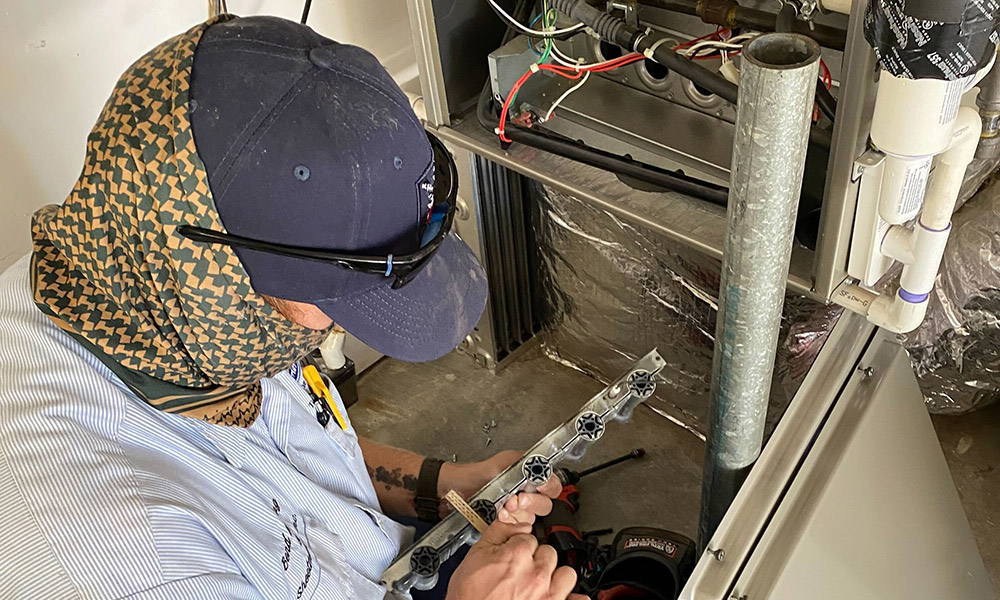Every summer through late fall in Central Oregon, wildfire smoke impacts Bend Oregon air quality for weeks or months. Improving your indoor air quality ahead of time means taking these steps to optimize your heating and cooling systems. Whether you have an existing air conditioning unit or not, here’s how to use your heating and cooling units effectively in the event of smoke.
Bad Bend Oregon Air Quality? Keep Your Home Sealed Up
Air conditioners help to filter indoor air continuously, but only some homes in Bend have them. If your home has no air conditioning unit, take these steps to help improve your indoor air quality. The first step is to seal any gaps where outside air can enter your home. Keep all windows and doors closed as much as possible, and place towels beneath the exterior door thresholds to help keep bad air out. If you don’t have a furnace, have portable fans running throughout the day, preferably with filters or an ionizer. If you do have a furnace but no AC, you can run your furnace fan continuously but make sure it has clean filters. When the outside air is clear again, open up all windows and doors to air out any smoke trapped inside your home.
For Homes With AC, Clean Indoor Air This Way
Homes with an air conditioning unit have more options for improving air quality and airflow during a smoke event. Firstly, run your air conditioner continuously throughout the day. Your air is circulating and filtering with every pass through your unit, so change your unit’s setting from “auto” to “on” to keep it filtering the air. To keep the ac on and running, you’ll need to set your thermostat at one to two degrees cooler than the current indoor temperature. Running the fan continuously should help clean the air of some smoke and improve your indoor air quality. Still, try to keep all doors and windows closed as much as possible. Continue running any extra portable air filtration units in the home to help scrub the air. If extra air filters are readily available, change them to ensure you get the highest filtration possible.
Change Air Filters For Higher MERV Ratings (But Watch Out For This)
A MERV rating (Minimum Efficiency Reporting Value) measures the air filter’s ability to capture particulates like dust, viruses, or smoke. The higher the rating, the less particulate you’ll have indoors. For example, good indoor air filters have a MERV 11 rating. However, homeowners should know that installing MERV filters can significantly downgrade the energy efficiency performance of your HVAC equipment. That’s why it’s crucial with forced air systems to consult an HVAC expert before installing any MERV filter. Bend Heating is experienced at optimizing indoor air quality, helping you choose a setup that doesn’t overtax your HVAC system. We also offer a variety of Air Scrubber or Reme Halo products that are incredibly effective and efficient at filtering air alongside your ducted system.
Get Your HVAC Unit Serviced For Optimal Performance
Heating and cooling systems aside, we recommend an annual service appointment for all HVAC equipment. The most common reason HVAC systems malfunction or break is from neglecting yearly maintenance. This overtaxes your heating and cooling system, causing it to break early or require a new unit. HVAC annual maintenance should include the following:
- Changing or washing all air filters
- Checking for refrigerant leaks
- Adjusting belts and inspecting pulleys and drives
- Inspecting heating coils
Ahead of Wildfire Season, Assess Indoor Air Quality With Bend Heating
Better air quality and filtration in your home is possible, even during the thickest wildfire season smoke. If you want to know more about the type of filters to install, the best air scrubbing products that filter out smoke, or ways to make your existing heat pump or air conditioner more efficient during wildfire season, contact us by phone at 541-382-1231 or through our contact form.
